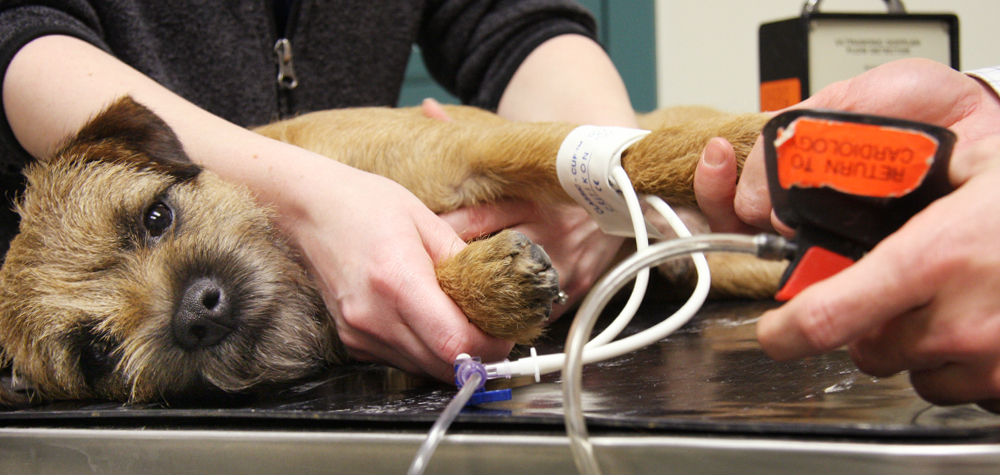What Pet Owners Should Know About CT Scans For Dogs}
Discovering the Important Providers Used by a Veterinary Cardiologist: Understanding Ultrasound and CT Check Methods
Veterinary cardiologists play an essential duty in the wellness of family pets by detecting and dealing with various heart conditions. They make use of sophisticated imaging strategies, such as cardiac ultrasound and CT scans, to provide precise evaluations. Each approach has its distinct benefits and applications. Comprehending these methods is necessary for pet proprietors seeking the most effective look after their friends. What aspects should pet proprietors think about when picking between these analysis tools?

The Duty of Vet Cardiologists in Family Pet Healthcare
Veterinary cardiologists play an important role in the medical care of animals, concentrating particularly on diagnosing and dealing with heart-related problems. They possess specialized training that allows them to analyze complex analysis tests and identify different cardio problems. These specialists use sophisticated methods, such as echocardiography and electrocardiography, to assess heart feature and framework accurately.Veterinary cardiologists additionally develop tailored therapy strategies that might include medications, way of living alterations, and, in many cases, surgical interventions. Their knowledge expands to informing pet dog proprietors about heart health, stressing the value of regular examinations and early discovery of possible issues. Collaboration with basic vets is crucial, as it ensures comprehensive take care of pets with suspected heart problems. By using specialized services, vet cardiologists considerably boost the high quality of life for pet dogs and offer satisfaction for their owners, enhancing the significance of heart wellness in general animal health.
Usual Cardiac Problems in Pets
Usual cardiac concerns in animals can greatly affect their wellness and lifestyle. Heart murmurs, different types of cardiomyopathy, and hereditary heart defects are among one of the most prevalent problems that veterinarians come across. CT Scans For Animals. Understanding these problems is essential for animal proprietors to guarantee timely medical diagnosis and appropriate treatment
Heart Murmurs in Pets
Although heart whisperings can be a source of problem for pet owners, they are not constantly a sign of significant health and wellness concerns. A heart murmur is an irregular noise generated by turbulent blood flow within the heart. In animals, these whisperings can be brought on by numerous factors, including hereditary heart flaws, valve problems, and even stress during evaluations. Lots of animals with heart murmurs lead normal lives without significant health and wellness effects. To identify the underlying reason, veterinary cardiologists often use diagnostic methods such as echocardiograms and Doppler ultrasounds. Early discovery and evaluation are necessary, as they may aid handle any kind of potential cardiac issues efficiently. Pet owners are motivated to consult their vet for a detailed assessment if a heart murmur is spotted.
Cardiomyopathy Types Explained
Cardiomyopathy incorporates a group of conditions affecting the heart muscle, leading to compromised cardiac function in animals. The most common kinds consist of expanded cardiomyopathy (DCM), hypertrophic cardiomyopathy (HCM), and limiting cardiomyopathy (RCM) DCM primarily affects pets, creating the heart to enlarge and damage, which reduces its ability to pump blood efficiently. On the other hand, HCM is a lot more common in pet cats, characterized by the enlarging of the heart walls, commonly leading to obstructed blood circulation. RCM, though much less common, happens when the heart muscle becomes inflexible, limiting its capacity to loaded with blood. Each kind provides one-of-a-kind difficulties in medical diagnosis and therapy, requiring specialized vet cardiological assessment to ensure peak management and look after affected animals.
Congenital Heart Defects
Congenital heart flaws stand for a substantial classification of cardiac problems in pet dogs, distinct from gotten problems such as cardiomyopathy - Ultrasound For Dogs. These flaws are structural problems present at birth, impacting the heart's typical function. Common kinds consist of patent ductus arteriosus, ventricular septal issues, and pulmonic stenosis. Signs may vary widely, varying from light to serious, and can consist of workout intolerance, coughing, and difficulty breathing. Early diagnosis through sophisticated imaging methods like ultrasound is vital for efficient monitoring. Veterinary cardiologists play a vital duty in recognizing these conditions and advising suitable treatment alternatives, which may include medical administration or medical intervention. Acknowledging genetic heart flaws enables better end results and improved top quality of life for affected animals
Understanding Heart Ultrasound: How It Functions
A significant variety of veterinary techniques now use heart ultrasound as an essential analysis device for assessing heart health and wellness in pets. This non-invasive technique uses high-frequency sound waves to create pictures of the heart's structure and function. During the treatment, a vet professional uses a gel to the pet's breast and utilizes a transducer to give off ultrasound waves. These waves bounce off the heart and surrounding structures, producing real-time images on a monitor.Veterinarians can examine different aspects of heart wellness, consisting of chamber size, wall surface activity, and shutoff feature. In addition, cardiac ultrasound permits the detection of irregularities such as liquid build-up and hereditary heart issues. This technique is essential for diagnosing problems that may not show up through basic radiographs. By offering comprehensive info concerning the heart's composition and performance, heart ultrasound aids in formulating effective therapy prepare for pets experiencing heart disease.
The Importance of CT Scans in Detecting Heart Issues
Exactly how do CT scans enhance the medical diagnosis of heart disease in vet medicine? CT scans offer in-depth cross-sectional pictures of the heart and bordering frameworks, allowing vets to envision intricate physiological relationships. This imaging technique is specifically useful in identifying hereditary heart flaws, heart growths, and problems in capillary. By making use of sophisticated imaging formulas, CT scans can examine heart chamber dimensions and function, offering a complete sight that might be challenging to accomplish with standard methods.Additionally, CT angiography can envision blood flow and determine areas of constriction or obstruction, which is essential for preparing prospective interventions. The speed and accuracy of CT scans likewise promote fast diagnoses, crucial in emergency situation situations. Ultimately, the browse this site unification of CT checks into veterinary cardiology significantly boosts the accuracy of diagnoses, enabling targeted therapy plans and improving individual results for animals experiencing from heart conditions.
Contrasting Ultrasound and CT Scan Techniques
While both ultrasound and CT scans are important devices in vet cardiology, they offer distinct benefits and constraints that influence their usage in detecting heart disease. Ultrasound, or echocardiography, provides real-time imaging of the heart's structure and function, enabling veterinarians to assess heart chambers, shutoffs, and blood circulation. It is especially efficient for evaluating problems like coronary infarction and cardiomyopathy. Ultrasound might be restricted in imagining specific anatomical structures due to client dimension or obesity.In contrast, CT checks offer detailed cross-sectional photos of the heart and surrounding tissues, making them optimal for recognizing structural irregularities, lumps, or vascular issues. Although CT scans offer complete understandings, they require sedation and might entail radiation exposure. Eventually, the option in between ultrasound and CT checks relies on the specific scientific situation, the person's condition, and the information needed for an accurate medical diagnosis.
Therapy Options Available Through Veterinary Cardiology
Vet cardiology supplies a series of treatment options tailored to attend to different heart disease in animals. Treatment strategies typically start with way of living alterations, including diet regimen adjustments and workout changes, targeted at boosting overall heart health and wellness. Drugs play an important function, with cardiologists recommending drugs such as diuretics, beta-blockers, and ACE inhibitors try this web-site to boost and manage signs heart function.In more serious situations, interventional procedures, such as balloon valvuloplasty or stent positioning, might be necessary to minimize obstructions or improve blood flow. For sure genetic heart issues, surgical options might be checked out to remedy structural issues. Additionally, recurring monitoring and follow-up treatment are crucial parts of an extensive treatment strategy, enabling timely changes based on the pet's response to therapy. Overall, vet cardiology concentrates on offering effective, personalized like maximize the wellness and wellness of animal people with heart disease.
How to Prepare Your Animal for a Cardiac Examination
Preparing an animal for a heart analysis is necessary to ensure accurate outcomes and a smooth procedure. Proprietors must initially schedule the appointment with the veterinary cardiologist and go over any type of specific needs or problems. It is a good idea to keep food for at least 12 hours prior to the evaluation, as this assists enhance imaging high quality during treatments like ultrasound or CT scans.Additionally, keeping a calm environment on the day of the visit can assist minimize the animal's anxiousness. It is useful to bring along any kind of appropriate medical records, including previous tests and drugs (Board Certified Veterinary Cardiologist). Owners need to likewise make sure that their pet fits and leashed throughout transport to the clinic. Finally, acquainting themselves with the evaluation procedure can aid and reduce concerns in asking informed inquiries throughout the appointment. By adhering to these steps, proprietors can add substantially to the performance of the cardiac analysis
Often Asked Inquiries
The length of time Does a Heart Ultrasound or CT Scan Take?
The period of a cardiac ultrasound generally ranges from 30 to 60 minutes, while a CT check might take approximately 15 to 30 minutes. Variables such as the patient's condition can influence these time price quotes.

Are There Any Type Of Dangers Related To These Diagnostic Procedures?

Can I Stick With My Pet Dog Throughout the Procedure?
The veterinary center's plan typically determines whether pet dog proprietors can continue to be throughout procedures. While some clinics urge owner existence for convenience, others may require separation to guarantee safety and security and ideal problems for analysis imaging.
How Much Do These Diagnostic Examinations Typically Expense?
The prices of analysis examinations, such as ultrasound and CT scans, usually vary based on place and facility. Generally, costs vary from a couple of hundred to over a thousand bucks, showing the intricacy and technology entailed.
What Is the Recovery Refine After a Cardiac Assessment?
The healing process after a heart analysis includes monitoring the family pet for any prompt responses, guaranteeing comfort, and restricting physical task. Vets usually offer post-evaluation instructions to guide family pet owners throughout this essential recuperation period. Heart murmurs, numerous types of cardiomyopathy, and congenital heart link issues are among the most prevalent problems that veterinarians run into. A heart murmur is an unusual noise generated by turbulent blood circulation within the heart. Cardiomyopathy includes a team of illness affecting the heart muscle mass, leading to endangered heart function in pet dogs. Congenital heart problems stand for a significant classification of cardiac concerns in animals, unique from gotten problems such as cardiomyopathy. Ultrasound, or echocardiography, gives real-time imaging of the heart's structure and function, permitting veterinarians to analyze heart chambers, valves, and blood flow.